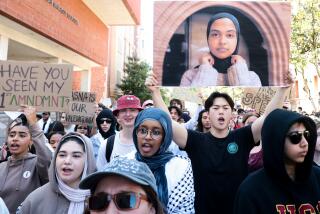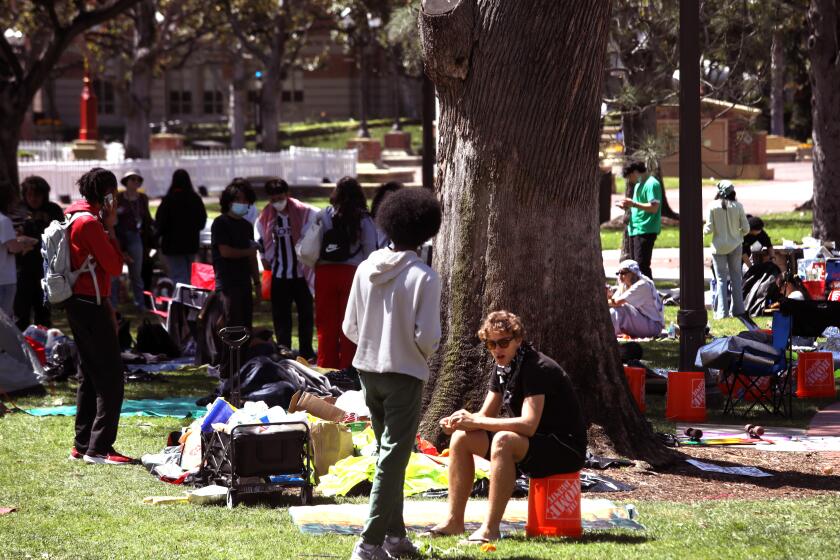Schools scramble to feed kids
Mylene Guzman walked her three daughters through the gate at Hollingworth Elementary School in West Covina straight to the cafeteria. The girls weren’t late to summer school classes, nor were they participating in any of the Rowland Unified School District’s theater or art programs.
The trio were there for lunch -- pizza and cherry-flavored applesauce. Rowland Unified is participating in the federal Summer Food Service Program, which allows Guzman, who lives within the district’s boundaries, to feed her daughters for free.
“We don’t quite qualify for food stamps, so this helps,” Guzman said. “I cook every day for the youngest, but when all three of them are home during the summer, it gets really hard.”
More than 18 million low-income students nationwide who eat lunch through the U.S. Department of Agriculture’s National School Lunch Program miss out on meals during the summer, according to a study released by the Food Research and Action Center, a childhood nutrition advocacy group.
In California, one in six students who qualify for free or reduced-priced meals during the school year will eat a free breakfast or lunch on campus during the month of July, when many schools aren’t in session, the study said.
During the recession, the number of students qualifying for school lunch programs increased to more than 3.3 million in 2012; 200,000 more students than in 2008. But summer programs have not caught up to the trend, said Crystal FitzSimons, director of feeding programs for FRAC.
The Los Angeles Unified School District and other school systems statewide have drastically cut summer school in the last few years, which, as a result, cut free meals for students. This year, L.A. Unified, Rowland and others reinstated their summer food programs at a limited number of schools where 50% of its enrolled students qualify for free- or reduced-priced lunch. The program allows the schools to serve anyone under age 18 food for free when he or she eats it on campus.
But the schools that aren’t participating in L.A. Unified’s program had to get creative.
Administrators of the Para los Ninos charter had to scramble to feed their students lunch and a snack as promised during its summer program. L.A. Unified, which supports the independently run charter’s breakfast and lunch during the year, did not extend that for the elementary school’s summer program .
The goal of the summer program is to support the young students’ literacy development and learning skills, a difficult task when children are distracted by their hunger, said Martine Singer, president and chief executive of Para los Ninos.
A grant from the Ford Foundation and a partnership with the Los Angeles Regional Food Bank summer program allowed for the school to feed more than 300 students at the charter’s two campuses near downtown Los Angeles.
Community partners, such as regional YMCA sites and programs through the city’s Department of Recreation and Parks enrolled in the USDA program to feed children who can’t get to schools.
A YMCA program in Bellflower recently joined a summer food service program to counter the number of fast-food restaurants in the community and provide the children in the area more healthful options.
“Once summer hits, we want to make sure that the children who stay home and don’t go to summer school have access to the healthy food to make sure they are ... ready to go back to school in the fall,” said Jackie Thurnau-Anderson, early-childhood and after-school specialist at the YMCA of USA.
The Rowland district, which has an annual enrollment of 15,000 students, serves fewer than 2,000 meals during the summer, though not all who eat are students.
“We have been really lucky we haven’t had to cut our summer program,” said Yvonne Martini, a kindergarten teacher at Hollingworth. “It keeps the kids on a schedule and helps their days stay on a system so they retain almost everything they’ve learned during the school year.”
As his older brother Ethan finished his lunch before returning to pre-algebra, 8-year-old Aaron Lo sat quietly, chomping on a pear.
Aaron isn’t taking any classes. Like the Guzman girls, he had to eat his lunch on campus before returning home.
“It’s cool having him here, though,” said 11-year-old Ethan. “It’s good he’s at school at least for a little while so he doesn’t miss it so much.”
--
dalina.castellanos@latimes.com
More to Read
Start your day right
Sign up for Essential California for news, features and recommendations from the L.A. Times and beyond in your inbox six days a week.
You may occasionally receive promotional content from the Los Angeles Times.






